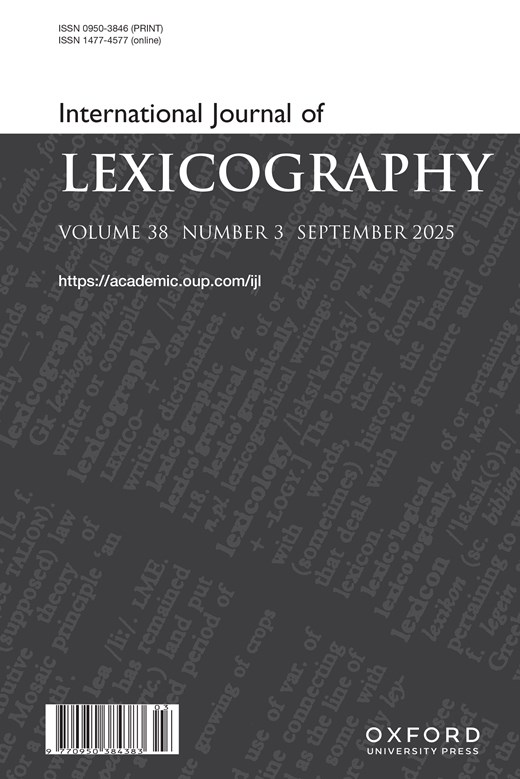
Lexicography and New Computational Technologies
This issue focuses exclusively on computational lexicography. All articles will be published in English.
Call for Papers — Special Issue (December 2026)
As Associate Editor,of the International Journal of Lexicography, this special issue aims to showcase rigorous and reproducible interdisciplinary approaches that combine lexicography and computational methods. We focus on pathways that transform large-scale linguistic data into usable lexicographic resources. We particularly welcome contributions exploring new computational technologies applied to lexicography, as well as the creation of digital dictionaries supported by these technologies (e.g., NLP, AI, databases, LLM methods, knowledge graphs, and ontological models such as OntoLex-Lemon). The goal is to build reliable, data-driven lexicographic resources—from corpus acquisition and preprocessing to sense modeling, micro/macrostructural design, evaluation, and deployment. Keywords : Lxicography, computational lexicography, NLP, digital lexicography, intelligent lexicography Scope (non-exhaustive) Corpus-driven dictionary building for all languages and scripts Data → Dictionary pipelines: ingestion, normalization, tokenization for multi-script and low-resource settings. Sense modelling & representation (polysemy, multiword expressions, phraseology) with OntoLex-Lemon, SKOS, and Linked Open Data. Knowledge graphs and alignments (e.g., Wikidata/DBpedia) for lexical/encyclopedic integration. LLMs in lexicography: definition generation, example sentence creation, error analysis, controllability, evaluation. Annotation & evaluation: guidelines, inter-annotator agreement, automatic metrics, human evaluation protocols. Cross-lingual/contrastive lexicography (including dialectal variation and transliteration issues). Tools & platforms: APIs, interfaces, and workflows for dictionary authoring, validation, and publication. Ethics & governance: bias, fairness, licensing, and sustainability of data and models. Applications: educational lexicography, domain-specific dictionaries, interactive/embedded dictionaries.
Evaluation
Each article will be evaluated by three reviewers. We will give priority to members of the scientific committee of our upcoming conference (NPCL² 2026 Conference
). However, if colleagues specializing in computational lexicology and lexicography would like to join the scientific committee, they are welcome to contact us. We would be delighted.
We would also like to clarify that, in accordance with the rules we have set for this special issue, members of the editorial committee are not allowed to submit articles.
Submission
The article must be written in English. Interested authors are invited to submit an abstract of approximately 500 words, accompanied by bibliographic references, to lian.chen@univ-orleans.fr and benedict_geng@mail.hzau.edu.cn no later than December 30, 2025. Accepted articles will be submitted via the ScholarOne platform. We will guide you through the entire submission process.
Important dates
The article must be written in English. Interested authors are invited to send an abstract of approximately 500 words, along with bibliographic references, no later than December 30, 2025.
Abstract submission: December 31, 2025
Notification of accepted proposals: January 15, 2026
Article submission: June 30, 2026
Initial feedback from reviewers: August 30, 2026
Submission of the final version of the article: October 30, 2026
Expected publication: December 2026
Associate Editor
CHEN Lian 陈恋
LLL, University of Orleans & CRLAO-CNRS-INALCO
lian.chen@univ-orleans.fr
GENG Yundong 耿云冬
School of Foreign Languages, Huazhong Agricultural University, China
benedict_geng@mail.hzau.edu.cn
Editors-in-Chief
Robert Lew Adam Mickiewicz University, Poznań, Poland
